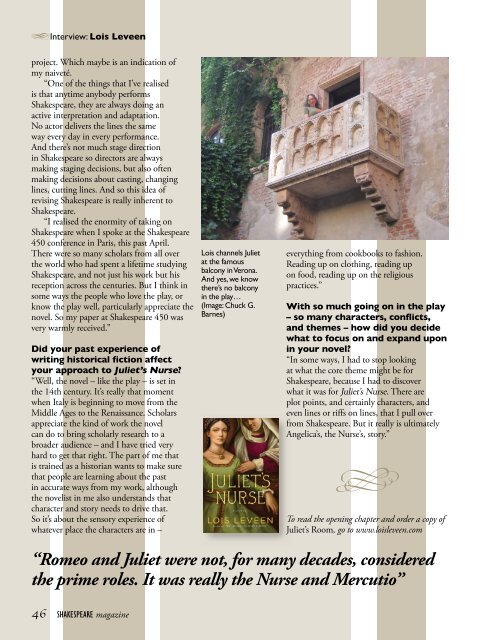Shakespeare Magazine 05
Issue 5 of Shakespeare Magazine celebrates the amazing Shakespeare documentary film Muse of Fire. We also investigate Shakespeare and the Tower of London, and take a trip to the American Shakespeare Center, while Shakespeare's Globe performs at the Inns of Court. Lois Leveen rethinks Romeo and Juliet with her novel Juliet's Nurse, while the Filter Theatre Company remixes Macbeth at the Tobacco Factory in Bristol. Plus! Station Eleven, the thrilling post-apocalyptic Shakespeare novel by Emily St. John Mandel.
Issue 5 of Shakespeare Magazine celebrates the amazing Shakespeare documentary film Muse of Fire. We also investigate Shakespeare and the Tower of London, and take a trip to the American Shakespeare Center, while Shakespeare's Globe performs at the Inns of Court. Lois Leveen rethinks Romeo and Juliet with her novel Juliet's Nurse, while the Filter Theatre Company remixes Macbeth at the Tobacco Factory in Bristol. Plus! Station Eleven, the thrilling post-apocalyptic Shakespeare novel by Emily St. John Mandel.
You also want an ePaper? Increase the reach of your titles
YUMPU automatically turns print PDFs into web optimized ePapers that Google loves.
Interview: Lois Leveen<br />
project. Which maybe is an indication of<br />
my naiveté.<br />
“One of the things that I’ve realised<br />
is that anytime anybody performs<br />
<strong>Shakespeare</strong>, they are always doing an<br />
active interpretation and adaptation.<br />
No actor delivers the lines the same<br />
way every day in every performance.<br />
And there’s not much stage direction<br />
in <strong>Shakespeare</strong> so directors are always<br />
making staging decisions, but also often<br />
making decisions about casting, changing<br />
lines, cutting lines. And so this idea of<br />
revising <strong>Shakespeare</strong> is really inherent to<br />
<strong>Shakespeare</strong>.<br />
“I realised the enormity of taking on<br />
<strong>Shakespeare</strong> when I spoke at the <strong>Shakespeare</strong><br />
450 conference in Paris, this past April.<br />
There were so many scholars from all over<br />
the world who had spent a lifetime studying<br />
<strong>Shakespeare</strong>, and not just his work but his<br />
reception across the centuries. But I think in<br />
some ways the people who love the play, or<br />
know the play well, particularly appreciate the<br />
novel. So my paper at <strong>Shakespeare</strong> 450 was<br />
very warmly received.”<br />
Did your past experience of<br />
writing historical fiction affect<br />
your approach to Juliet’s Nurse?<br />
“Well, the novel – like the play – is set in<br />
the 14th century. It’s really that moment<br />
when Italy is beginning to move from the<br />
Middle Ages to the Renaissance. Scholars<br />
appreciate the kind of work the novel<br />
can do to bring scholarly research to a<br />
broader audience – and I have tried very<br />
hard to get that right. The part of me that<br />
is trained as a historian wants to make sure<br />
that people are learning about the past<br />
in accurate ways from my work, although<br />
the novelist in me also understands that<br />
character and story needs to drive that.<br />
So it’s about the sensory experience of<br />
whatever place the characters are in –<br />
Lois channels Juliet<br />
at the famous<br />
balcony in Verona.<br />
And yes, we know<br />
there’s no balcony<br />
in the play…<br />
(Image: Chuck G.<br />
Barnes)<br />
everything from cookbooks to fashion.<br />
Reading up on clothing, reading up<br />
on food, reading up on the religious<br />
practices.”<br />
With so much going on in the play<br />
– so many characters, conflicts,<br />
and themes – how did you decide<br />
what to focus on and expand upon<br />
in your novel?<br />
“In some ways, I had to stop looking<br />
at what the core theme might be for<br />
<strong>Shakespeare</strong>, because I had to discover<br />
what it was for Juliet’s Nurse. There are<br />
plot points, and certainly characters, and<br />
even lines or riffs on lines, that I pull over<br />
from <strong>Shakespeare</strong>. But it really is ultimately<br />
Angelica’s, the Nurse’s, story.”<br />
<br />
To read the opening chapter and order a copy of<br />
Juliet’s Room, go to www.loisleveen.com<br />
“Romeo and Juliet were not, for many decades, considered<br />
the prime roles. It was really the Nurse and Mercutio”<br />
46 SHAKESPEARE magazine

















